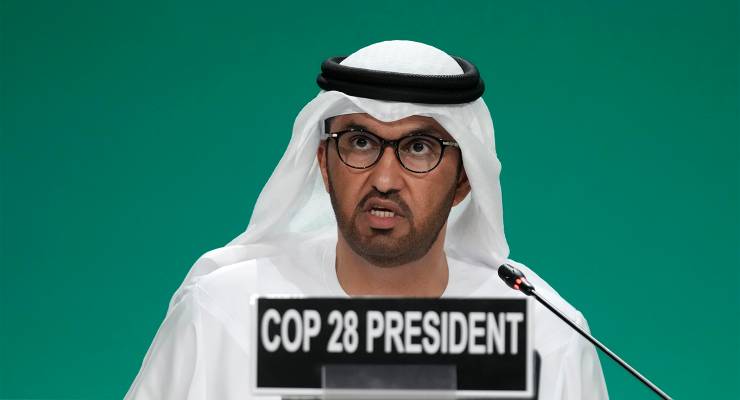
As with previous UN climate conferences, the 28th Conference of the Parties (COP28) in Dubai is riddled with fossil fuel lobbyists — Associated Press reports that at least 1,300 representatives of fossil-fuel companies are at the conference. Unusually, the representation extends to the conference president, with the chair of the Abu Dhabi National Oil Company, Sultan Ahmed al-Jaber, leading the event.
As has been revealed, the United Arab Emirates COP delegation, including al-Jaber, intends to use the conference to negotiate oil and gas deals, while al-Jaber claims no science says phasing out fossil fuels is necessary to keep global warming under a critical threshold. When criticised, he said yesterday, inevitably, that he’d been misinterpreted.
Other groups attending in large numbers are auditors and consultants. According to the official list of participants, KPMG globally has sent 64 people, PWC 51, Deloitte 47, Ernst & Young 60, McKinsey 59 and Boston Consulting Group 19. Most, including some of the firms’ global chairs, are attending as guests of governments.
The presence of representatives of the big consulting firms is noteworthy given the role they have played in facilitating tax avoidance by fossil-fuel and other companies contributing to the climate crisis. But the consulting arms of the Big Four, and McKinsey and BCG, have all been enthusiastic spruikers of the primary fossil-fuel industry strategy to derail climate action — carbon capture and storage (CCS).
KPMG, PWC, Deloitte, EY, McKinsey and BCG constantly argue that CCS is viable and necessary for decarbonisation, despite mounting evidence that even the easiest forms of CCS, such as Chevron’s Gorgon CCS project in Western Australia, simply don’t work at anywhere near their forecast capacity. All of them offer consultancy services for firms that want to model potential CCS investment, although McKinsey is the most honest of the big firms, slapping a large “Would you like to learn more about our Oil & Gas Practice?” ad in the middle of a CCS blog post.
CCS is lucrative for big consulting firms because of the large volume of cash from the fossil-fuel industry looking to manufacture the myth that CCS works. The firms offer services to design market mechanisms and risk assessment, “share learnings”, provide “best practice” governance and business models, develop standards and design networks to “give investors confidence in capitalising on CCUS hubs”.
McKinsey, by the way, is also “providing information and analysis” directly to al-Jaber, Le Monde reported.
Prominent Australia climate criminal Santos used the conference to announce it was teaming up with al-Jaber’s company to “scale up” CCS: “We know a large scale-up of CCS is required to meet the world’s climate objectives and companies like Santos and ADNOC have the technology, infrastructure and knowhow to be able to deliver low-cost CCS and low-carbon energy on a global scale. Santos continues to work with governments to urgently progress the necessary regulatory, fiscal and carbon credit frameworks …”
COP28 may produce little in the way of meaningful climate action, but the world’s biggest consulting firms know a honeypot when they see one, and the 1,300 fossil-fuel representatives attending all represent great business opportunities.








in the unlikely event of some carbon being captured .. who is responsible for its ongoing incarceration.. don’t look up down or sideways..
We can put it in soda fountains for our gin and tonics